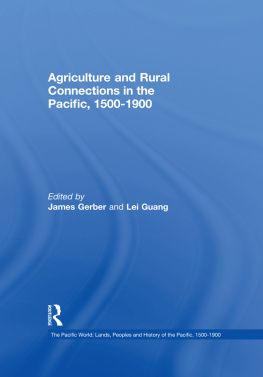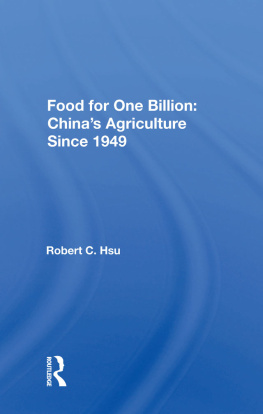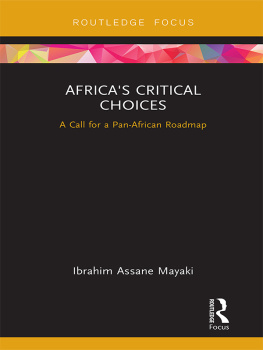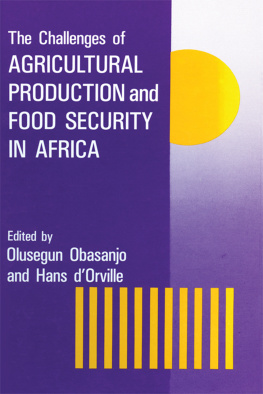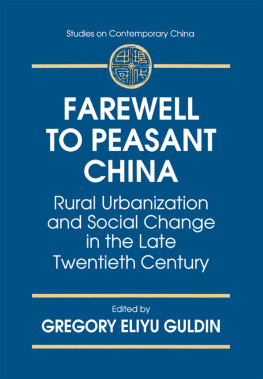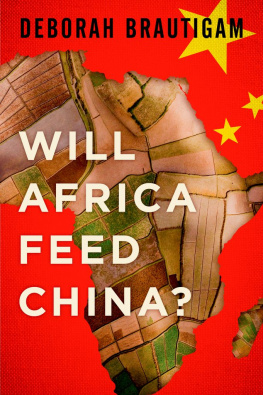Farewell to Farms
Farewell to Farms
De-agrarianisation and Employment in Africa
Edited by
Deborah Fahy Bryceson and Vali Jamal
African Studies Centre
Research Series 1997/10
Research Series of the African Studies Centre, Leiden
Vol. 1 | Tied to the land. Living conditions of labourers on large farms in Trans Nzoia District, Kenya
Dick Foeken & Nina Teilegen, 1994 |
Vol. 2 | Asylum or Aid? The economic integration of Ethiopian and Eritrean refugees in the Sudan
Tom Kuhlman, 1994 |
Vol. 3 | Quest for self-esteem. State, Islam and Mundang ethnicity in Northern Cameroon
Kees Schilder, 1994 |
Vol. 4 | Taking the waters. Soil and water conservation among settling Beja nomads in Eastern Sudan
Johan A. van Dijk, 1995 |
Vol. 5 | Gender and class in the tea estates of Cameroon
Piet Konings, 1995 |
Vol. 6 | Passing on the rites of passage. Girls initiation rites in the context of an urban Roman Catholic community on the Zambian Copperbelt
Thera Rasing, 1995 |
Vol. 7 | Seasons and nutrition at the Kenya coast
Jan Hoorweg, Dick Foeken & Wijnand Klaver 1995 |
Vol. 8 | Tropical Africas emergence as a banana supplier in the inter-war period
John A. Houtkamp, 1996 |
Vol. 9 | Nomads and the state in Africa: the political roots of marginality
Victor Azarya, 1996 |
In memory of Mboya Bagachwa
First published 1997 by Ashgate Publishing
Reissued 2018 by Routledge
2 Park Square, Milton Park, Abingdon, Oxon, OX14 4RN
52 Vanderbilt Avenue, New York, NY 10017
Routledge is an imprint of the Taylor & Francis Group, an informa business
Copyright African Studies Centre, Leiden, 1997
All rights reserved. No part of this book may be reprinted or reproduced or utilised in any form or by any electronic, mechanical, or other means, now known or hereafter invented, including photocopying and recording, or in any information storage or retrieval system, without permission in writing from the publishers.
Notice:
Product or corporate names may be trademarks or registered trademarks, and are used only for identification and explanation without intent to infringe.
Publishers Note
The publisher has gone to great lengths to ensure the quality of this reprint but points out that some imperfections in the original copies may be apparent.
Disclaimer
The publisher has made every effort to trace copyright holders and welcomes correspondence from those they have been unable to contact.
Cover design: Peter Stroo
ISBN 13: 978-1-138-33550-9 (hbk)
ISBN 13: 978-0-429-44267-4 (ebk)
Contents
Deborah Fahy Bryceson
Hamid el Bashir Ibrahim
Yohannes Habtu
Kate Meagher and Abdul Raufu Mustapha
Mohammed A. Iliya and Ken Swindell
Meine Pieter van Dijk
Dick Foeken
Mboya S.D. Bagachwa
Rudo B. Gaidzanwa
Poul Ove Pedersen
Leslie Bank
Ian Livingstone
Tesfaye Teklu
Deborah Fahy Bryceson
This book is the product of the effort and creative thought of a large number of people. Its origins date back to a workshop held at the Afrika-Studiecentrum, Leiden in May 1994 funded by the Ministry of Development Cooperation of the Dutch Government and the International Labour Office, Geneva. The papers in this book have benefited greatly from the face-to-face encounters of workshop discussions. Since then, the production of this book has been globalised. Vali Jamals work commitments at the International Labour Office took him to Bangkok, so three-way dialogues between editors in Europe and Asia and authors in Africa and Europe proceeded by whatever form of communication was available, ranging from press of a button e-mail messages to crackly telephone lines and dodgy postal services. Ann Reeves directed the traffic and copy editing work with enormous skill and practicality from Leiden. The book layout and cover design benefited from the creative talents of Adri van den Berg and Peter Stroo. The Afrika-Studiecentrum provided the infrastructural support and funding for seeing this book through to publication. We are grateful for the help and advice of all those involved.
The Editors
Leiden and Geneva
Deborah Fahy Bryceson*
It is generally assumed that Africa is the worlds most agrarian continent. Vast deserts, forests, and savannah lands populated by wild animals and farmers with rudimentary technology of the hoe or plough is the image conjured up by the mention of Sub-Saharan Africa. African farming has a tinge of the frontier about it in both spatial and technological terms. Another image, less bucolic but perfectly compatible, is that of starving people in wasteland settings. The two images put together suggest to many outsiders that the solution to Africas problems lies in African farmers modernising their agriculture. African farmers, voting with their feet, are not as sure.
This book is about people, male, female, young, middle-aged, and old, who in one way or another are easing away from a strictly agrarian existence. They are choosing non-agrarian livelihoods in the rural areas or more urbanised existences. Their decisions are rational in economic, social, political and psychological terms. In many cases, they are not only beneficial to the individual directly involved but function for the common good of the household, community, region and nation-state. The negative connotations that de-agrarianisation may hold for the outside observer are generally biased. The title of this book, Farewell to Farms, has been deliberately chosen to challenge the unwarranted assumption that the African continents destiny is necessarily rooted in peasant agriculture. It refers to an ongoing process in which the continents population is becoming less agrarian in nature year by year.
This chapter defines de-agrarianisation and cites official statistics demonstrating that a process of de-agrarianisation is currently under way in Africa and has been on-going for several decades. Reasons why western opinion, particularly that of donor agencies, has been averse to de-agrarianisation are explored through a review of western social science concepts of African development. The utility of the informal sector concept is considered before outlining the general focus and sectional breakdown of the remainder of the book.
De-agrarianisation is defined as a long-term process of: (1) occupational adjustment, (2) income-earning reorientation, (3) social identification, and (4) spatial relocation of rural dwellers away from strictly peasant modes of livelihood (Bryceson 1996). Not all facets of de-agrarianisation necessarily unfold simultaneously. Rather, asynchronic development is the norm. Some countries have experienced periods when migration to urban areas, i.e. (4), has been rapid, leading to a marked change in rural life vis-a-vis the other facets. At times, physical movement of people from rural areas or noticeable transformations of social identities have been minimal although rural-based diversification into non-agricultural activities is taking place and leading to measurable differences in individual and household sources of income. There are innumerable permutations of the de-agrarianisation process, as illustrated by the case studies in this book, so much so that the overall tendency can be masked by the variations. Nonetheless, broad continental tendencies towards residential and occupational change are clearly evident in available statistics (Table 1).


